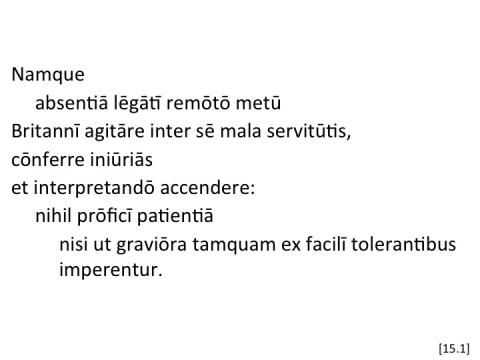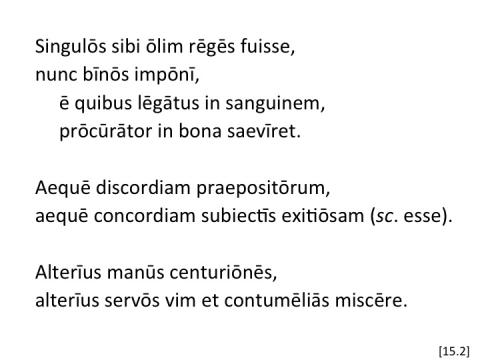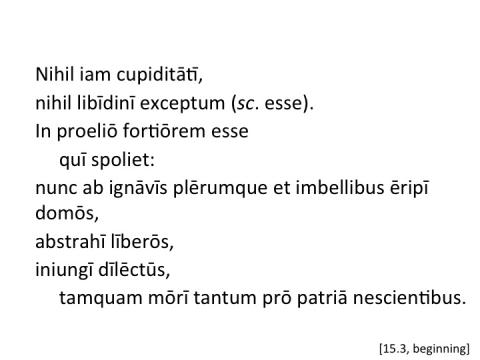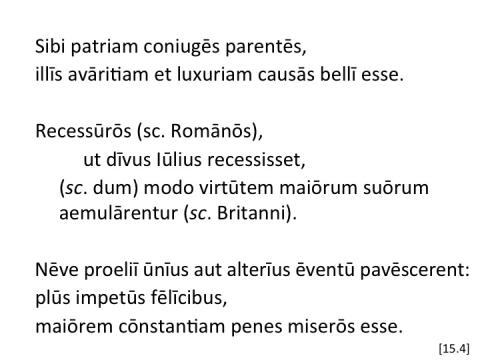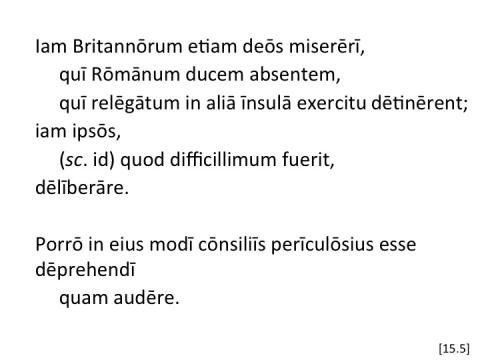Overview: The Britons give vent to their dissatisfaction and exhort one another to cast off the Roman yoke. (Stuart); this chapter begins on f. 56r. of the codex Aesinas.
15.1
agitāre ... conferre: "debated ... talked over." (Gudeman); historical infinitives. (Damon) [A&G 463]
interpretandō accendere: "they intensify their wrongs by putting constructions upon them." In discussing the conduct of their rulers the Britons naturally saw the acts of the Romans in the worst light. (Stuart); interpretari means not only "to explain the real meaning of something," but also "to put a construction upon something," "to view in a certain light." We might, perhaps, translate here "by misrepresentation." (Pearce); "exaggerating in the heat of discussion." (Gudeman) accendere: common in metaphors in the sense of "to kindle" (spem, studium, iram accendere). Here it is transferred from the feeling aroused to the cause of the feeling — the wrongs. We had better translate, however, "inflamed their sense of their wrongs." (Pearce)
nihil prōficī: Oratio Obliqua. (Pearce) [A&G 577]; similar complaints are attributed to Boudicca in Tacitus’ Annals and in the elaborate speech which Dio Cassius put into her mouth. On the rhetorical character of these speeches and their purpose, see Introd. p. xv. Noteworthy rhetorical features, accumulated in this short passage, are: anaphora, asyndeton, antithesis, rhythmical endings, or clausulae. The verb of saying must be supplied from interpretando; see Introd. p. xxxi, #6. (Gudeman)
patientiā: "submission," as in chapter 2.3. ... The speech is, of course, manufactured by Tacitus to suit the occasion. See Introduction, p. xviii. By this device he puts the just complaints of the Britons in their own mouths and thus lends a dramatic touch to his narrative. (Stuart)
tamquam: expressing the considerations by which the Romans were guided in oppressing the natives, not the opinion of the author. (Stuart)
ex facilī = facile. (Gudeman); ex with the neuter ablative of the adjective has the force of a simple adverb. See note on ex aequo, ch. 20.4. (Stuart)
tolerantibus: dative. (Pearce) [A&G 367]
15.2
bīnōs: distributive form of "two," acc. subject of imponi. (Jacobson)
ē quibus, etc.: observe the prolepsis, legatus and procurator being, for the sake of conciseness, put into the relative clause. The regular form would have been: legatus et procurator, e quibus ille … hic. See ... Introd. p. xxx, #18. (Gudeman)
in sanguinem: by enlisting them as soldiers as well as by inflicting punishment and subjecting them to forced labor. (Stuart)
prōcūrātor: their covetousness was notorious. (Gudeman)
discordiam: friction between civil and military authority. (Stuart)
aequē ... aequē: repeated for emphasis. Aeque ac is the usual formula. (Stuart)
exitiōsam: sc. esse. (Damon)
alterīus … alterīus: with the first understand legati, with the second, procuratoris manus, centuriones being in apposition to the former, servos to the latter. (Gudeman)
manūs: "tools, catspaws." (Stuart); in the principal manuscript the word is abbreviated and has been read as both manus and manum (see line 8 in the left-hand column and note below). The former is metaphorical and paralleled at 32.3. (Damon) manum: "the attendant troop," "gang." Centuriones and servos are in apposition to manum. Contrast Agricola's management of his household in 19.2. (Pearce)
vim et contumēliās miscēre: cf. the phrase "To add insult to injury," and with the sentiment, the complaint of Boudicca in Ann. 14.31. (Gudeman)
15.3
exceptum: sc. esse. (Damon); "is exempt from." (Stuart)
ab ignāvīs: i.e. the Romans. (Pearce) ignāvīs plērumque et imbellibus: plerumque, as belonging to both adjs., is placed between them; see Introd. p. xxvi, #4. (Gudeman)
ēripī domōs: this remarkable figure, for pellere domibus, is chosen for the sake of syntactical symmetry with the succeeding members of the asyndeton. (Gudeman)
tamquam: again introducing the Romans' contemptuous estimate of the Britons. (Stuart) tamquam ... nescientibus: this case is the dative of indirect object with the infinitives above, tantum goes closely with pro patria. Translate "as though we could die for any cause but our country's." (Pearce) [A&G 370]; i.e. in the belief that we know how to die well enough, but not in behalf of our country. (Gudeman)
quantulum: like quantus quisque, "how few." The diminutive here emphasizes the relative smallness of the enemy's number when compared to their multitudes. (Gudeman)
enim: implies an ellipsis as follows: they think that we are not to be feared; on the contrary they are at our mercy, for, etc. (Stuart); the expression is elliptical. The unexpressed thought of the speaker is, "yet they will find themselves mistaken (for how insignificant are their numbers)." (Pearce)
mīlitum: i.e. Romanorum. (Stuart)
sīc: "even so," i.e. as the Britons intend to do. The reference is to the defeat of Varus in 9 CE. (Pearce); i.e. in the same way as we shall do now. (Gudeman)
Germāniās: the plural of names of countries is often used when the different administrative or geographical divisions are thought of. See our expression, "Czar of all the Russias." Germany was divided into an Upper and a Lower Province. The destruction of the legions of Varus in 9 CE caused a setback to Roman power in Germany, but by no means marked its extinction. (Stuart); Tacitus speaks loosely of the free Germans in the terms of the two Roman provinces. (Pearce); if the allusion, as is likely, is to the defeat of Varus by Arminius in 9 CE, the plural is rhetorical for Germaniam inferiorem, which would have been too cumbrous and pedantic. (Gudeman)
et = et praeterea. See note on 11.2. (Gudeman); "and yet." (Pearce)
15.4
avāritiam et luxuriam: in the eyes of the victims the stock motives of Roman conquest. (Stuart)
causās: "incentives." (Gudeman)
dīvus Iūlius: the ceremonial designation has a somewhat incongruous sound in barbarian mouths. Some editors unnecessarily regard divus as an ironical touch. As a matter of fact the Roman historians are constantly neglecting dramatic fitness in speeches of this kind. In Book 21 of Livy the student can discover various passages in which Carthaginians speak in Roman terms. (Stuart); a purely Roman expression put unnaturally, like Germanias just above, into the mouth of the British speaker. It may, however, be sarcastic from its combination with recesserit. (Pearce); "even Caesar had to retreat, god though he be." ... Here the irony is somewhat out of place, as Divus could not refer to an act of the living Caesar; but so Caesar is called dictator by an analogous anachronism in the passage cited below. (Gudeman)
recessūrōs … aemulārentur: supply respectively Romanos and Britanni. These different subjects would be more clearly designated in direct discourse (recedent ... aemulemur). (Gudeman) aemulārentur: the sense will suggest the subject. (Pearce)
modo: for si modo or dummodo. (Gudeman)
fēlīcibus: the Romans. (Stuart)
15.5
iam ... etiam: if Britannorum had not intervened, Tacitus would have said iam et. (Gudeman)
miserērī: the infinitive for the deponent misereor, not the impersonal miseret. (Damon) [A&G 354a]
relēgātum: a technical term for banishment. Suetonius was, as it were, "marooned." (Stuart) in aliā īnsulā: observe that Boudicca is here supposed to have known that Britain was an island. On such inconsistencies, see notes on 31.4 and 10.2. (Gudeman) relēgātum in aliā īnsulā: various emendations have been proposed for this unusual construction. (Damon)
iam ipsōs ... dēlīberāre: in Oratio Recta, iam nos ipsi (i.e. as opposed to the Romans) quod difficillimum fuit ("has been hitherto") deliberamus. (Pearce)
quod difficillimum fuerit: "'Tis the first step that costs." Quod is relative. (Stuart) [A&G 304 and 307d]; on the lack of concerted action on the part of the Britons see 12.2. (Pearce) fuerit: for fuit in direct discourse. (Gudeman)
porrō: adds a fresh reason. (Pearce)
audēre: used absolutely. (Gudeman)

